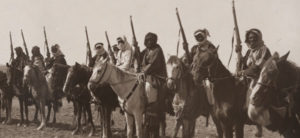1918 Arabs Fought for Turkey in World War I
“Most annoying, to anyone who was served with the British and the Sherifian Arab forces in the Palestine campaign and knows something of the history of that campaign, are the pretensions of the Arabs of Palestine to have rendered important military services to the Allies in the Great War.
Many of the Transjordanians and the Hejazis, whom, for all their talk of Arab union, the Palestine Arabs dislike and fear as rude and hardy men, played their part right well under the inspiring leadership of Emir Faisal and Colonel T.E. Lawrence; but the Palestinians confined themselves to deserting in large numbers to the British, who fed and clothed and paid for the maintenance of many thousand such prisoners of war, few indeed of whom could be induced to obtain their liberty by serving in the Sherifian Army.”
- A Biscoe Moore, The Mounted Riflemen in Syria and Palestine, pp. 64, 107, 156, 169:
“They (the Arabs) were on many occasions suspected of carrying information to the Turks of British movements. They will do anything for material gain, a little loot or ‘backsheesh,’ and on more than one occasion were responsible for the deaths of New Zealanders.
Treacherous as the Bedouins are known to be, it was very necessary to keep well clear of their camps, as none of them would be above trying for a little’backsheesh’ from the Turks if they thought it could be obtained by giving warning of our approach.
Our men had suffered from the treachery of the natives throughout the campaign and the feeling against them was to come to a head with tragic results.”
- Major C.S. Jarvis, Three Deserts, p. 299-303, who spent eighteen years living and working with the Arabs, describes the situation in even more realistic terms:
“The truth of the matter is that the national desire for independence was confined solely to the few educated Arabs in the cause, such as Faisal, and that among the fighting men and the sheikhs of the tribes who led them this feeling was conspicuous by its absence. The only method of keeping these patriots in the field was by payment in gold, and when the Arab sees gold his natural avarice causes him to lose all control of himself, so that squabbles as to the respective donations to various tribes were of daily occurrence.
In action they were entirely without discipline, and the first hint of loot meant that the greater part of the attacking force broke off the engagement before it was completed, to rifle the enemy’s captured baggage. After a successful raid when the Arabs were loaded with looted corn and rations nothing would keep them in the field, and they trickled back to their tents and womenfolk so that a striking force on which their commander was relying for another attack on the railway would scatter into the desert in a night.”
“The Syrians as a people did nothing whatsoever towards assisting the Arabs cause except for the isolated action of some Bedouins in the very last stages of the campaign and the services of a few Syrian officers who deserted from the Turkish Army. The great mass of the Syrians did absolutely nothing beyond hold secret meetings and talk. The inhabitants of Palestine did rather less than this.”
- T.E. Lawrence, Seven Pillars of Wisdom, pp. 103-104:
“Blood feuds were nominally healed. All the same, the members of one tribe were shy of those of another, and within the tribe no man would quite trust his neighbor. Each might be, usually was, whole-hearted against the Turk, but perhaps not quite to the point of failing to work off a family grudge upon a family enemy in the field. Consequently they could not attack. One company of Turks firmly entrenched in open country could have defied the entire army of them; and a pitched defeat, with its casualties, would have ended the war by sheer horror.
I concluded that the tribesmen were good for defense only. Their acquisitive recklessness made them keen on booty, and whetted them to tear up railway, plunder caravans, and steal camels; but they were too free-minded to endure command, or to fight in team.”
- Lieutenant Colonel Vickery, “Journal of the Central Asian Society,” 1923, pt. 1, p. 57.
“One Arab [says Vickery] had attracted my notice―one Saleh, and he was asked to act as chief of staff. He replied that he could only answer for his own men―thirty in all. On trying to form up the remainder, three hundred at once sat down on the beach, saying they were tired, and they had come ashore for a little rest and a sleep. They started to light fires, and were obviously not going to fight. I turned to the remainder, two hundred of whom at once announced that they were not fighting men; they had come to loot. Off they went along the seashore, saying that they would wait outside the town till I had captured it, an operation they hoped that I should execute with great promptitude, as they were in a hurry. The remainder condescended to follow us at the moment when the first gun of the S.N.O.’s flagship opened on the town. A seaplane which went up was received with a brisk fire by the Turkish garrison, and the observer was unfortunately killed. Shortly afterwards we ran into a Turkish patrol. We were lucky enough to shoot first, and dropped three of them, but it was enough for some 250 of the Arabs.”
Source: Hearings Before the Committee on Foreign Affairs House of Representatives Seventy-Eighth U.S. Congress Second Session on H. Res. 418 and H Res. 419 Resolutions Relative to the Jewish National Home in Palestine. February 8, 9, 15, and 16, 1944. With Appendix of Documents Relating to the Jewish National Home in Palestine. (p. 320-322)




